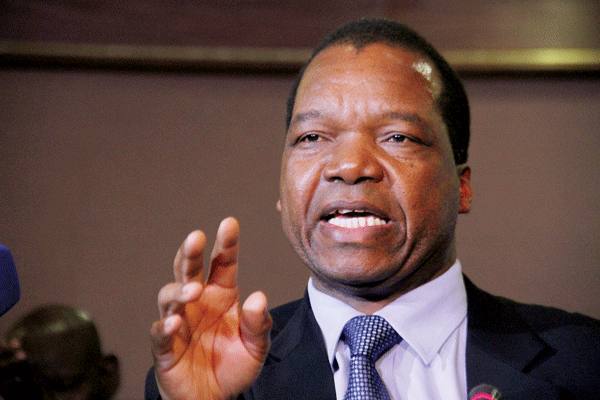
RESERVE Bank of Zimbabwe (RBZ) governor John Mangudya is this week expected to present the monetary policy statement amid calls that he should address the deep-seated currency challenges which are affecting the economy.
By Fidelity Mhlanga / Mthandazo Nyoni
This comes at a time when industry has raised the red flag warning that the country’s manufacturing base would collapse within a month if government did not urgently resolve the currency crisis in the short term.
Civil servants are also pushing for salary increments to match the rising cost of living that has escalated on the back of currency volatility.
Just two weeks ago, business was brought to a standstill for three days as demonstrators took to the streets protesting against a massive rise in government tax on fuel which then increased the fuel cost build-up.
In his last monetary policy statement, Mangudya directed local banks to separate hard currency deposits from RTGS balances, effectively admitting that the two were not of equal value.
The move unnerved the market resulting in wild price hikes and acute shortages of basic commodities.
Economist Eddie Cross said Mangudya should set an independent monetary policy committee and demonetise the bond note.
- Chamisa under fire over US$120K donation
- Mavhunga puts DeMbare into Chibuku quarterfinals
- Pension funds bet on Cabora Bassa oilfields
- Councils defy govt fire tender directive
Keep Reading
“This monetary statement will be the most important for some time. I’m expecting the minister and the governor to discuss the formation of the monetary policy committee (MPC) and to set the committee terms of reference giving them independence from the Ministry of Finance and the central bank. I’m expecting them to announce an outline of future monetary policy. The latter will include demonetisation of the bond note and the adoption of a new local currency in due course,” Cross said.
He said there was need to halt the practice of sweeping foreign currency balances from private accounts to the private banks.
“At the same time they need to arrange for the MPC to float the RTGS dollar and set daily exchange rates. This is the only way to remedy the present chaos,” he said.
Confederation of Zimbabwe Industries (CZI) president Sifelani Jabangwe said the central bank should put in place a platform to trade currency to avert business from closing.
“Given that the RBZ does not have the currency to allocate to business, industry has almost stopped. We are thus lobbying government for a legal platform to trade currency otherwise most business will close,” Jabangwe said.
CZI recently said that companies were left with a month’s supply of raw materials and were on the verge of winding up operations as a result of the forex shortages.
As the economy continues to tank, economist John Robertson said government would shift from the fallacy that the US dollar is trading pari passu with the bond.
He added that this could be done by the banks, who could work together to see that supply and demand set the prices.
“Our currency crisis was caused by government printing money and by our own need for imports that exceed export values. So, government has to cut its own costs to spend no more than tax revenues and industry has to produce more so that we import much less,” said Robertson.
Confederation of Zimbabwe Retailers president Denford Mutashu said government should adopt a proper currency to end the pricing dilemma obtaining on the market.
“We expect the normalisation of the price situation and that has to bring finality on the pricing model. So far we have a distorted market where others demand US dollars while mainstream retailers are not allowed to sell in forex. There is a dilemma in that certain imported products are paying duty in forex and yet retailers are not allowed to sell in forex. So there is need for policy interventions. The MPC should address such critical issues on whether we are re-dollarising or we are introducing our own currency,” Mutashu said.
Zimbabwe National Chamber of Commerce chief executive Christopher Mugaga is of the opinion that Mangudya should mop up the excess liquidity in the economy, which is the major cause of currency distortions prevailing in the market.
“The governor must tell us on how he is going to mop up excess liquidity in banks. We are on the edge and the centre can no longer hold. There is also need for debt profiling, showing how much we owe to different countries in the world,” Mugaga said.
Economic analyst Shoko added that the only way out of the situation was to demonetise the bond and take it out of circulation.
“He (Mangudya) needs to see how he stops the bond from circulating and also needs to address the RTGS balances that ballooned because of indiscipline by both government and the public so that we find a way towards a genuine currency. But we have to understand and appreciate the fact that it is not an overnight thing no matter how bad it is performing because there is a serious amount of that money which is in circulation,” said Shoko.
“He needs to find a way to attract diaspora remittances into the formal economy so that the funds contribute to the development of the economy because some of these challenges can be addressed if we get the remittances circulating in the formal economy. There is also need of addressing trust in the banking system because at the moment very few people are comfortable with the idea of putting their foreign currency in the banks”











